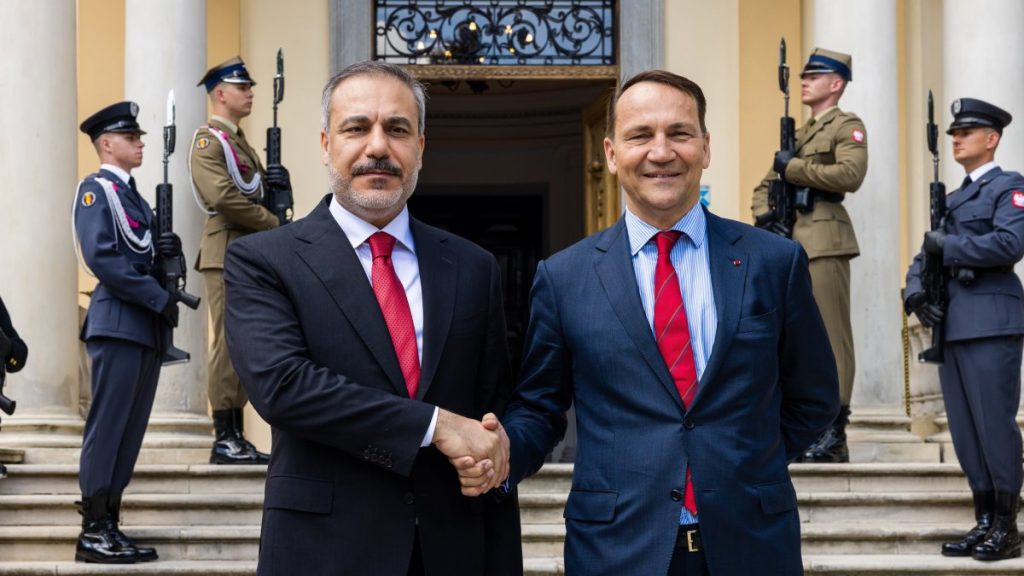Türkiye and Poland are advancing their economic partnership, with expanding trade and investment prospects ushering in a new age of cooperation, a Polish diplomat has said.
Speaking to Anadolu Agency (AA), Witold Lesniak, Poland’s consul general in Istanbul, highlighted the dynamic relationship between the two nations and emphasized growing partnership in sectors such as agriculture and cosmetics.
“Our economic partnership is thriving,” Lesniak said. “We see great potential in further strengthening our bilateral ties, especially in trade, innovation and mutual investment.”
Expanding horizons
Trade between Poland and Türkiye reached 12.2 billion euros ($12.6 billion) in 2023, a 17% increase from the previous year. Polish exports to Türkiye grew by over 21%, while imports from Türkiye rose by 14.6%.
Despite this success, Lesniak emphasized the need for balance in the trade relationship as Poland had a deficit of 2.9 billion euros in its trade with Türkiye last year.
“We aim to create a more balanced trade relationship while fostering innovation and investment in key sectors,” he noted.
Turkish companies have also been active in Poland, operating 168 entities and generating 800 million euros in revenue in 2022.
Firms like Gülermak, which is involved in metro construction projects in Warsaw, are prime examples of successful collaboration. On the other side, Polish companies such as Asseco and Polopharma have established a strong presence in Türkiye, further strengthening economic ties.
Nevertheless, certain challenges persist in trade. Trade regulations designed to protect local producers can create difficulties for exporters.
Lesniak emphasized that it is natural for every nation to protect its own producers and underlined that as the two countries continue to familiarize themselves with each other’s products, they will recognize them as good alternatives.
Beauty, food sectors
Poland’s cosmetics and health food products are gaining traction in Türkiye, reflecting a growing middle-class demand for sustainable and premium options.
Lesniak described the trend as a testament to the strengthening economic ties between the two nations.
“The demand for Polish cosmetics and health food products in Türkiye is a clear sign of the expanding scope of our bilateral trade,” he said.
“Polish companies are committed to delivering products that align with the needs of Turkish consumers while emphasizing quality and sustainability.”
Poland’s beauty sector, valued at over 6.5 billion euros in 2022 with a projected growth of 6.2% in 2023, is making significant inroads in Türkiye.
Brands such as Ziaja, Inglot and Pierre Rene are recognized for their eco-friendly formulations, sustainable packaging, and affordability.
“Our cosmetics are not just about beauty,” added Lesniak. “They represent our values in environmental responsibility and innovation, and we are proud to see Turkish consumers embracing them.”
The health food industry is another area of success, with companies like Lestello and Kupiec introducing popular products such as rice cakes and puffed wheat to the Turkish market.
Known for sustainable farming practices, Poland’s agricultural exports, including fruits and dairy, totaled over 47.6 billion euros in 2022, a 25% increase from the previous year.
“Poland’s health food sector exemplifies our commitment to sustainability and quality,” Lesniak noted. “These products are tailored to meet the expectations of health-conscious Turkish consumers, fostering greater collaboration in the food industry.”
Lesniak, noting that Turkish people tend to be somewhat traditional, especially regarding food, said this poses challenges for Polish brands trying to enter the market.
However, he believed this issue could be resolved with greater awareness of Polish brands.
Historical bonds
Innovation also becomes at the heart of Poland and Türkiye’s economic cooperation. The Polish Investment and Trade Agency’s (PAIH) Istanbul office is playing a crucial role in building business-to-business relationships, focusing on sectors such as cybersecurity.
“Innovation is a cornerstone of our collaboration,” said Lesniak. “The Polish-Turkish Forum on Cybersecurity is just one example of how we are aligning our expertise to address global challenges.”
Beyond economic ties, Poland and Türkiye share deep cultural and historical connections. The town of Polonezkoy in Istanbul’s Anatolian side, established by Polish settlers during the 19th century, remains a symbol of this enduring friendship.
“We are proud of the historical bond that Polonezköy represents,” Lesniak said. “It is a witness to the longstanding relationship between our nations.”
Bright future
Looking ahead, Poland is eager to explore further collaboration in energy, education and sustainable development.
Notably, Polish firms are contributing to Türkiye’s renewable energy sector, including a major solar power project supported by the Polish Export Credit Insurance Corporation (KUKE).
“The choices we make today in energy and sustainability will shape the future of our nations,” said Lesniak. “Poland and Türkiye are united in their commitment to green energy.”
As 2024 approaches, both nations are set to deepen their partnership, leveraging their strategic locations and economic strengths.
“Poland and Türkiye share a vision for a prosperous and innovative future,” concluded Lesniak. “Together, we can achieve remarkable growth for our peoples.”


